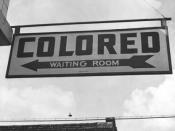Although there is a definite connection between slavery and racism, the questions that may arise deal with exactly how intertwined they are, and how far back their connection goes. There are a variety of views regarding these questions. One view is that the origins of slavery are economic. Another is that the origin of slavery is racism. Yet a third is that slavery arose as a result of racism.
Some people view racism as having existed long before slavery began. If this is so, however, the relationship between the colonists and the Indians would have been much different. The Indians were viewed by the colonists as savages who would go to any length to harm the colonists. Yet the colonists never exploited the Indians, and eventually even sought peace with them in some areas. Therefore, it is unlikely that these same people would have brought African Americans from halfway around the world solely because they had harsh feelings towards them, or because they wanted to exploit these individuals.
With this in mind, the next view seems far more logical. This view is that slavery was a byproduct of economic need. The African Americans were brought to the New World as stepping stones to boost the economy. With the growing agricultural developments, there was a demand for many more workers than were available. The plantation owners felt that they had a good solution, which was to import people from overseas who would be willing to work the land at a low wage. At this time, many African Americans in England were in debt, and saw this as a "temporary fix, and figured that they would complete the work, repay the money, and be set free. It was only in time that this changed, and that their work became more fixed. If the colonists truly had a bias against these African Americans, they would not have used them as stepping stones for building the economy.
If this is so, then racism is merely a byproduct of slavery, not a cause or intended goal. Over time, people began to depend on these African Americans, and felt that they were capable workers. This led to plantation owners refusing to let them go free. People who saw this felt that these people once brought to help the economy were now merely tools, which made them low class, and less recognized. They were viewed solely as planters and gatherers, no different then the tools they used to perform these activities. As this continued, people began to agree with such views, and eventually the African Americans became known as the lower portion of society, and Caucasians therefore viewed themselves as superior-racism in its earliest stages.
In conclusion, the origin of slavery was solely economic. The colonists needed an expedient to boost the economy, and found it in the cheap labor the African Americans were willing to provide. Racism only evolved as an exaggeration of the conditions of their work, which was began by the people in society, and was not the intended goal.





